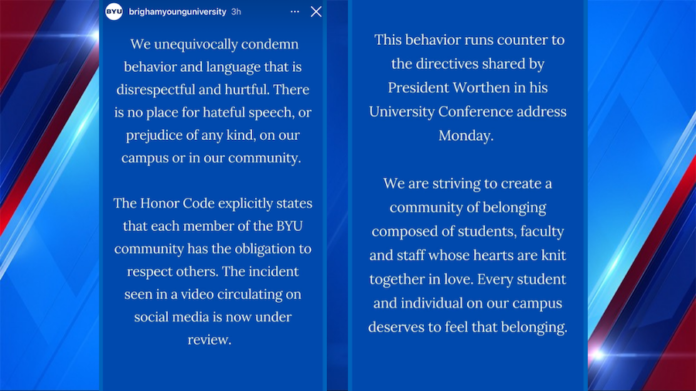
PROVO, Utah (ABC4) – A video of a man attempting to erase LGBTQ+-friendly sidewalk chalk before uttering a homophobic slur at the campus of Brigham Young University is drawing outrage and attention from community members and school officials.
(WARNING: The video linked below contains offensive language.)
In the video, which has been posted on several Reddit forums as well as other social media platforms, a male with blonde hair dressed in a grey and black shirt with black sweatpants and Converse All-Star shoes, is shown pouring out a bottle of what is likely water on rainbow-colored chalk on the sidewalk.
When confronted by the person recording the video and others, the man finishes off the bottle before walking away, saying “Oh no, f*ggots go to hell.”
“I’m sure the Bible actually says that,” a voice from behind the camera responds, sarcastically.
In response to the video’s widespread circulation, BYU posted a statement in the Stories feature of its Instagram account and on Twitter.
We unequivocally condemn behavior and language that is disrespectful and hurtful. There is no place for hateful speech, or prejudice of any kind, on our campus or in our community. 1/4
— BYU (@BYU) August 27, 2021
“We unequivocally condemn behavior and language that is disrespectful and hurtful. There is no place for hateful speech, or prejudice of any kind, on our campus or in our community. The Honor Code explicitly states that each member of the BYU community has the obligation to respect others. The incident seen in a video circulation on social media is now under review. This behavior runs counter to the directives shared by President Worthen in his University Conference address Monday. We are striving to create a community of belonging composed of students, faculty and staff whose hearts are knit together in love. Every student and individual on our campus deserves to feel that belonging.”
The incident captured on video is considered by many to be an extension of the issues surrounding the treatment of LGBTQ+ students at the university, which is owned and operated by The Church of Jesus Christ of Latter-day Saints.
On Monday, BYU President Kevin Worthen announced the creation of a new “Office of Belonging” at the university, which was founded to help create a sense of community for students that may feel marginalized due to race, gender, or sexual orientation.
“It will provide guiding principles for evaluating and implementing the recommendations provided by the Committee on Race, Equity and Belonging. But it will also be the guide for addressing the needs of all marginalized individuals on campus,” Worthen said at the University Conference on campus.
[embedded content]
Worthen’s announcement was followed by a speech by Elder Jeffery R. Holland, a member of the Church’s Quorum of the Twelve Apostles, which has created further controversy on social media and in the BYU, Utah, and LDS community.
In his address, Holland compared defending the Church’s – and therefore BYU’s – stance that sexual relations should exist only in a marriage between a man in a woman to “musket fire.”
Holland also stated that he and the other members of the Church’s highest leadership council have “spent more time and shed more tears on this subject than we could ever adequately convey to you this morning, or any morning. We have spent hours discussing what the doctrine of the Church can and cannot provide the individuals and families struggling over this difficult issue. So, it is with scar tissue of our own that we are trying to avoid — and hope all will try to avoid — language, symbols, and situations that are more divisive than unifying at the very time we want to show love for all of God’s children,” referring to students and church members who feel a same-sex attraction or gender conflict.
While declaring his love and concern for those who feel perhaps out of the mold of a typical student at BYU, Holland continued by adding his desire for a balance between compassion and adherence to the church’s principles and commandments.
“But it will assist everyone in providing such help if things can be kept in some proportion and balance in the process. For example, we have to be careful that love and empathy do not get interpreted as condoning and advocacy, or that orthodoxy and loyalty to principle not be interpreted as unkindness or disloyalty to people. As near as I can tell, Christ never once withheld His love from anyone, but He also never once said to anyone, “Because I love you, you are exempt from keeping my commandments.” We are tasked with trying to strike that same sensitive, demanding balance in our lives.”







